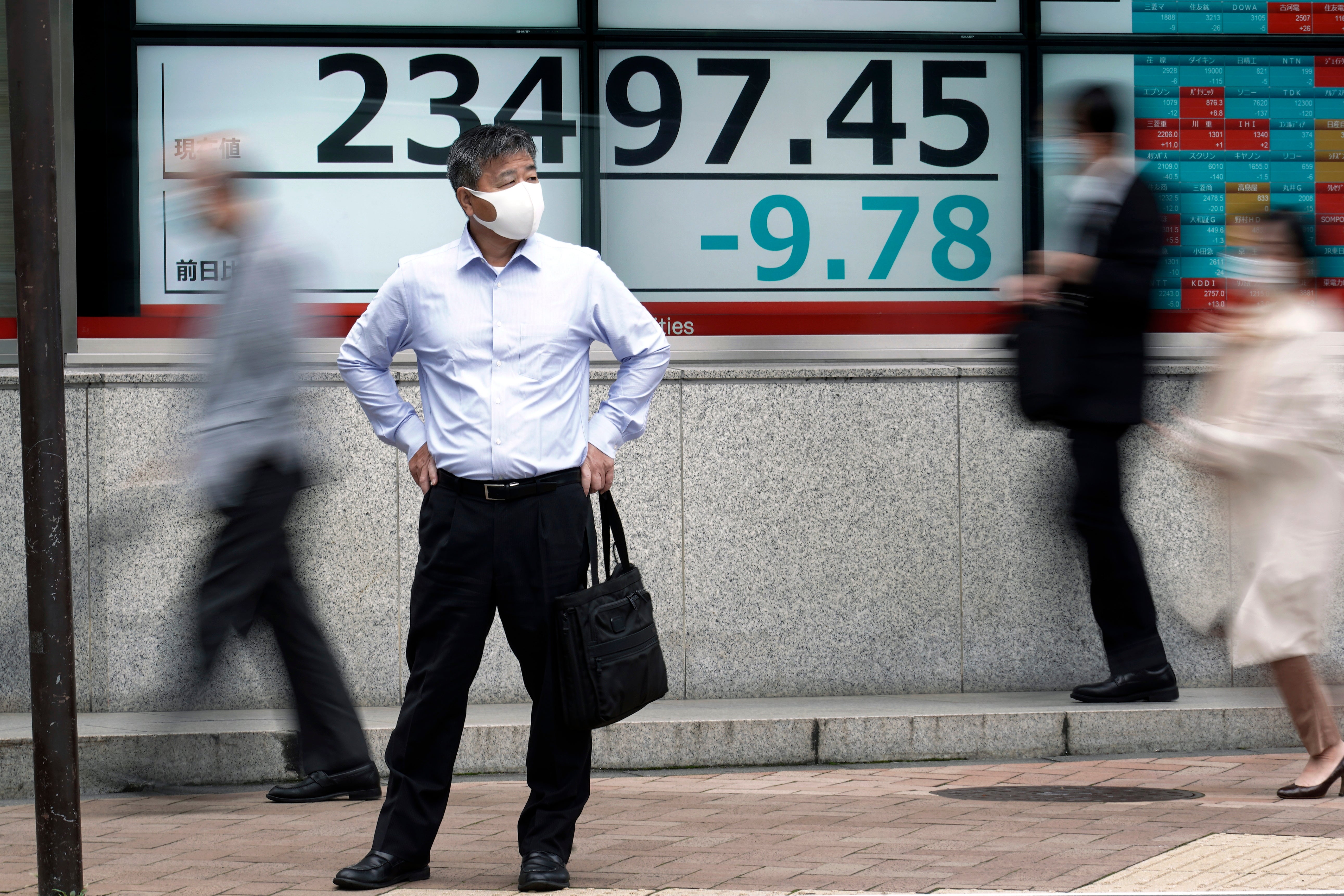Asian shares mixed amid 2nd wave coronavirus, election fears
Asian shares are mixed as investors weigh concerns about the U.S. presidential election and an economic stimulus package, on top of flaring outbreaks of coronavirus

Your support helps us to tell the story
From reproductive rights to climate change to Big Tech, The Independent is on the ground when the story is developing. Whether it's investigating the financials of Elon Musk's pro-Trump PAC or producing our latest documentary, 'The A Word', which shines a light on the American women fighting for reproductive rights, we know how important it is to parse out the facts from the messaging.
At such a critical moment in US history, we need reporters on the ground. Your donation allows us to keep sending journalists to speak to both sides of the story.
The Independent is trusted by Americans across the entire political spectrum. And unlike many other quality news outlets, we choose not to lock Americans out of our reporting and analysis with paywalls. We believe quality journalism should be available to everyone, paid for by those who can afford it.
Your support makes all the difference.Asian shares were mixed on Friday as investors weighed concerns about the U.S. presidential election and an economic stimulus package, on top of flaring outbreaks of coronavirus.
Looking ahead, markets are awaiting the release of data on the Chinese economy next week.
Shares rose in China but fell in Japan, South Korea and Australia.
Stocks ended mostly lower on Wall Street, giving the S&P 500 its third straight loss this week.
Japan's benchmark Nikkei 225 fell 0.3% in afternoon trading to 23,429.75. Australia's S&P/ASX 200 shed 0.5% to 6,176.80. South Korea's Kospi declined nearly 1.0% to 2,337.81. Hong Kong's Hang Seng gained 1.1% to 24,425.13, while the Shanghai Composite rose 0.2% to 3,338.10.
“Asian stocks look set for a mixed start today as traders digest the latest news on U.S. stimulus negotiations amid a resurgence in COVID-19 cases in some parts of the world,” said Stephen Innes, chief global market strategist at Axi.
“The markets’ on again off again love affair with an impending stimulus torrent masks the fact that investor uncertainty is bristling ahead of an expected choppy period in terms of headline risk,” Innes said.
U.S. stock indexes erased much of their early losses and closed modestly lower Thursday, extending the S&P 500's losing streak to a third day.
Wall Street has turned cautious this week amid a confluence of worrisome trends for the economy, which is still hampered by the pandemic. Coronavirus infections are rising in Europe, prompting governments in France and Britain to impose new measures to contain the outbreak. Caseloads area also climbing in the Americas and parts of Asia.
In the U.S., investor optimism that the Trump administration and Congress will soon reach a deal on another round of stimulus for the economy has waned.
Meanwhile, campaign theatrics continue, with the latest question whether the debate scheduled next week between President Donald Trump and former Vice President Joseph Biden will go ahead as planned. The clash planned for this week was called off after Trump's bout of coronavirus. Biden has said he plans to participate in next week’s debate but that he would ask Trump to take a COVID-19 test before arriving.
The S&P 500 fell 0.2% to 3,483.34. The Dow Jones Industrial Average dropped 0.1% to 28,494.20, while the Nasdaq composite dropped 0.5% to 11,713.87. The Russell 2000 index of small-cap stocks bounced back from an early slide to gain 1.1%, closing at 1,638.88.
U.S. data on unemployment claims also weighed on investor sentiment. The Labor Department said Thursday that the number of Americans seeking unemployment benefits rose last week to 898,000, a historically high number that exceeds analysts forecasts.
Investors are also watching for earnings reports from U.S. and global companies for signing on how they are holding up amid the pandemic. A resurgence in COVID-19 cases in regions around the world will mean limits on public life, including a possible return to lockdowns that are damaging to growth.
In energy trading, benchmark U.S. crude lost 37 cents to $40.59 a barrel in electronic trading on the New York Mercantile Exchange. It gave up 8 cents on Thursday to $40.96. Brent crude, the international standard, fell 41 cents to $42.75 a barrel.
The U.S. dollar stood at 105.27 Japanese yen, down from 105.42 yen late Thursday. The euro cost $1.1706, little changed from $1.1710.
____
AP Business Writer Alex Veiga contributed.